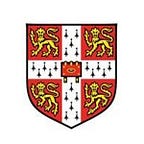The student championing the Land Girls and Lumber Jills
Women played a vital but sometimes under-recognised role in World War II. Cherish Watton, a student at Lucy Cavendish College, is determined that their efforts will be remembered. History is what she loves doing.
Women are often forgotten in mainstream history. In sixth form I did an extended project on the work of the Women’s Land Army, looking at the Land Girls who kept the farms going during World War II. I set up a website that aims to fill a gap in national awareness on the organisation, as well as providing information for families wanting to find out more about the work of their female relatives. I’m also interested in Women’s Timber Corps, women affectionately named Lumber Jills who worked in forestry. This is the topic of my final year dissertation.
I appeared on Country File, the BBC television programme. This was before I started at Cambridge and gave me the opportunity to discuss the First World War Women’s Land Army and show viewers magazines read by Land Girls. Since being at Cambridge, I’ve discussed the Second World War Women’s Land Army on Heir Hunters, another BBC television series. I’m always thinking about history from academic and public history perspectives.
Before coming to Cambridge, I took a three-year gap. In my first gap year I started my own business. I’d always been interested in environmental issues and education. I set up as a consultant advising organisations on how to work with young people and raise awareness of the importance of energy and water saving in schools. I also helped evaluate programmes which brought together environmental conservation with team-building and leadership activities.
Students at Lucy Cavendish are 21 and over. By the time I applied to Cambridge I was 20. I was offered a place at Lucy Cavendish, an all-female college for mature students. I really enjoy being part of a college where the students are older, if only slightly older, than the majority of other students — and where many have done other things before going to university. Students at Lucy Cavendish come from all over the world and the conversations we have at dinner are astounding.
History is what I love doing. I’m now in my third year and thinking about what to do next. I’m planning to stay on at Cambridge to do a masters, which will probably lead to a PhD. My key interest is history and gender, particularly the social history of women’s wartime participation in 20th-century Britain. I’m fascinated by how women remembered and represented their wartime experiences.
Studying at Cambridge is hard work. But it’s rewarding too. A lot is expected which means you learn fast. In the first year, we had to research and write weekly essays of 2,500 words. The questions are sometimes really broad, such as “Why did the ‘North’ win the Civil War?” and sometimes more specific, for example “Why did rising living standards appear to cause more problems for Labour than for the Conservatives in 1950s Britain?” In supervisions [small group teaching sessions] you get to discuss these topics with leading historians who encourage you to be critical. Often I leave supervisions buzzing with new angles for exploration.
I used a little-known 18th-century diary as the basis for my first piece of independent research. Nancy Woodforde was niece to James Woodforde, an 18th-century parson famous for his diaries. Nancy’s uncle left meticulous journals that give historians a window into clerical life in rural Norfolk. Just one of Nancy’s diaries survives — it’s for the year 1792. Nancy moved to live with her uncle when she was 22. She recorded her visits to friends and neighbours, along with her income and expenditure. The diary, along with her uncle’s, is useful for understanding the involvement of dependent women in clerical households.
My high points have included winning two prizes. In my first year I won the Kate Bertram Prize for First Class results in Prelims [exams]. In my second year I won the Cambridge Historical Prize for outstanding performance in the Themes and Sources Long Essay in Part I of the History Tripos. Both prizes came as a complete surprise. Winning them has been a real boost and encouraged me to submit my work to journals and to be more confident.
I don’t enjoy exams — I much prefer coursework. I love the research process, getting your hands dirty in the archives. Things feel more out of your control in exams, but some people like that spontaneity. It feels like there is so much to remember!
I’m an online student ambassador at Lucy Cavendish. A group of us put forward our names as online student ambassadors willing to promote the college online through various platforms I write a blog about the experience of being a history student. I hope it gives potential applicants an idea of what it’s like to study at Cambridge and demystifies the process. I certainly found it useful to hear what a student’s ‘average’ day was like when I was finding out more about Cambridge life.
Period dramas are something I really enjoy. These dramas are useful for providing a window into the world of history — though they must be taken with a large pinch of salt. Since studying at Cambridge, I’ve been a lot more critical about their representation of history. I enjoy writing blog posts which critically engage with their presentation of history, most recently analysing the gender relations in the ITV series ‘Victoria’. Maybe James and Nancy Woodforde will feature in their own period drama sometime soon.
Cherish Watton is a history student at Lucy Cavendish College. The profile is part of our This Cambridge Life series.
